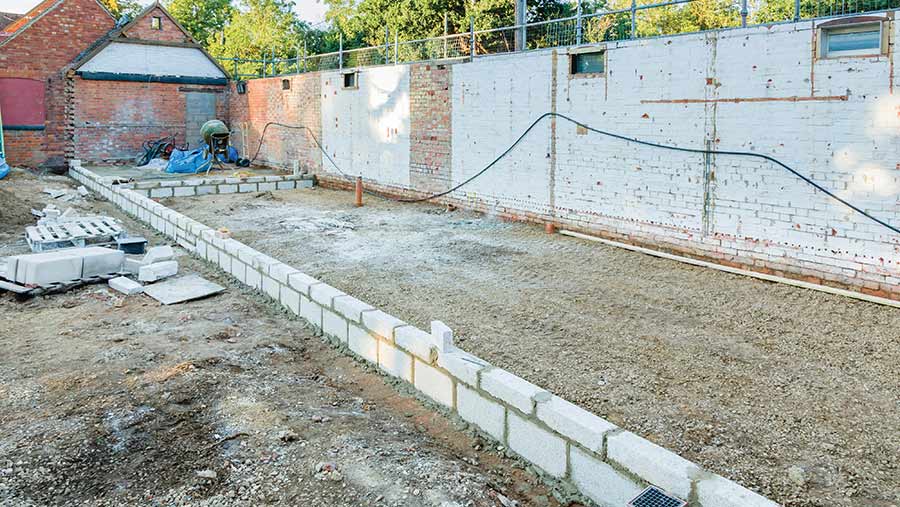Rural England Prosperity Fund: What is it and how to access it
 © iStockphoto.com/Matthew Troke
© iStockphoto.com/Matthew Troke The government announced the Rural England Prosperity Fund (REPF) in 2022 as a top-up to the UK Shared Prosperity Fund (UKSPF).
A total of £110m is ringfenced in the REPF for local authorities to provide capital grants to businesses and organisations in rural areas, with the aim of creating jobs and promoting economic growth.
See also: £110m allocated to grants to boost England’s rural economy
The money is also designed to be used to tackle challenges faced by rural communities, such as poor digital connectivity and a lack of access to key services.
Earlier schemes such as the European-funded Leader and Growth Programme and Countryside Productivity grants offered similar support and had a significant positive effect on individual businesses and the local rural economy. However, these have been phased out in the post-Brexit world.
“These schemes provided funding to many farms and estates to develop food processing businesses, diversify into rural tourism or invest in farm equipment that improves their competitiveness,” says Marie Charles, a farming and research consultant with Strutt & Parker.
“The Rural Fund is similar, as it aims to grow the rural economy.”
Local authorities
In total, 117 local authorities have been provided with a financial allocation, with the largest funding pots allocated to Cornwall and the Isles of Scilly (£5.6m), North Yorkshire (£5.4m), Somerset (£3.4m), Cambridgeshire and Peterborough (£3.2m) and Northumberland (£3m).
REPF tips
- Each authority will operate this scheme differently, so monitor local authority websites regularly to see what is being promoted
- Look at the maximum grant limit and check the requirements for funding the remainder
- Check the eligibility criteria closely
Defra had originally indicated that the funding should be available from April 2023, but it is only in recent weeks that a significant number of councils has started to issue details of what grants will be available and when.
The rollout of the scheme is proving patchy, so applicants will need to be proactive to discover what is available in their area.
By late July, just over 40 councils had announced details of the sort of funding rural businesses will be able to apply for, although not all of these have actually opened for applications.
The money will be spread by councils over two financial years (2023-24 and 2024-25), but must be spent by 31 March 2025.
“We are keeping a close eye on how the fund is being delivered, but this involves approaching each local authority individually as it is down to councils to decide how the money should be spent within parameters set by Defra,” says Marie.
“Unfortunately, there are some councils that have already opened and then closed the first application round of their schemes, which will be frustrating for farmers.
“However, there will be other rounds and there are many local authorities that are yet to announce anything, so now is a good time to investigate what might be available.”
What is the fund for?
Essentially, the Rural Fund will provide capital funding to:
- Support new and existing rural businesses to develop new products and facilities that will be of wider benefit to the local economy. This includes farm businesses looking to diversify income sources other than from agriculture
- Support new and improved community infrastructure, providing essential community services and assets for local people and businesses to benefit the local economy.
Each local authority is taking a slightly different approach, but the sort of projects that may be eligible for funding include the conversion of buildings into farm-based tourism facilities or the purchase of equipment for food processing.
Some councils may also be willing to fund pieces of farm machinery, if the purchase helps to meet other grant objectives – for example, innovation and progress on the road to net zero.

© Paul-Maguire/Adobe Stock
How much grant money is available?
The grants on offer differ widely between local authorities. For example, Market Harborough Council in Leicestershire is offering grants of £5,000-£20,000, whereas offers from Buckinghamshire Council range from £2,500 to £300,000.
For commercial projects the grant will typically cover up to 40% of costs and evidence may be required that the applicant can make up the remainder.
What is the application process?
Again, this differs between local authorities. Two-stage application processes are common, with the first stage often being an expression of interest.
Some forms can be obtained online, but in other instances farmers will need to request a form direct from the council.
Quotes are likely to be needed for the proposed works as part of the application.

© Dariusz Gor/aAdobe Stock
Any tips for applying?
Applicants will need to be proactive and may need to act fast. Some local authorities have already issued a call for projects on their websites and then closed the window for applications within just a couple of weeks.
Although there should be future rounds of the scheme, farmers will need to monitor their local council’s website closely, or they could miss out.
The fact that each local authority is implementing the scheme differently and on varying timetables makes the scheme difficult to monitor.
Some authorities have highlighted that projects which also contribute to mitigating environmental impacts and help the UK meet net-zero targets will be prioritised for funding.
Projects that have already received funding under schemes such as the Farming Investment Fund and Farming in Protected Landscapes programme cannot apply for funding under the REPF.
Teething problems
The Country Land and Business Association (CLA) warns that the rollout of the Rural England Prosperity Fund (REPF) is a mixed picture because the administration and delivery has been delegated to local authorities, rather than being run centrally.
Charles Trotman, CLA senior economist, says local authorities that are handling the launch well include Cornwall and West Yorkshire, which is probably because they have the experience of delivering the EU-funded predecessor schemes.
However, there are others that do not seem to really understand why they have been given the money and what they are going to spend it on.
This has led to the problem of some councils asking to spend the REPF funding on their own pet projects, rather than using it as Defra intended on diversification opportunities and improving local community infrastructure.
“We realise there are a lot of questions being asked by local authorities, which Defra is now having to pick up and answer,” says Charles.
“But Defra has been very clear that the REPF is to fund diversification opportunities and growth in the rural economy.”
Local solutions
The principle that local problems should be solved by people with local solutions is supported by the CLA, but a lack of experienced administrative capacity in some councils has led to significant teething problems, it says.
Councils that are struggling to work out how to deliver the scheme should engage with external stakeholders who can help guide them on how the money can be spent in ways that deliver value for money to the taxpayer, says Charles.
“We think the purpose of the fund is to help as many people as possible to stimulate as much growth in the rural economy as possible.”
A further concern raised by the CLA is that when councils are opening schemes they aren’t always promoting them properly.
”Our plea is that councils tell us when they are going to open an application window so we can help to promote them.”
Examples of schemes
West Yorkshire Combined Authority is offering grants of between £10,000 and £50,000, although the percentage of total project costs this covers could range from 40% to 100%, depending on the type of project and whether it is for profit or not-for-profit.
Eligible projects include farm diversification into rural tourism, such as a glamping site, food processing – for example, dairy processing equipment – and other business development projects.
West Lindsey District Council in Lincolnshire is offering grants of £1,000-£15,000 for non-agricultural farm diversification and agri-tech business development projects.
The fund is open to applications at any time and is due to close in December 2024, but it may close earlier if all of the funding allocation has already been awarded.
North Somerset Council is offering grants of £3,000-£30,000, although it expects most applications will be less than £10,000.
Eligible projects include converting farm buildings to other business uses and investments in tourist accommodation and event venues as a farm diversification.
However, the deadline for applications under this round is 4 August.
